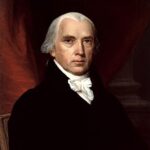The Pragmatic Constitutional Evolution
Madison’s creation of the Second Bank of the United States marked a dramatic shift in his constitutional philosophy. Previously a strict constructionist opposing Hamilton’s original bank, Madison recognized America’s desperate need for financial stability after the War of 1812. 📊 The war exposed critical weaknesses in the nation’s banking system, with over 200 state banks issuing unreliable currency.
Financial Crisis Demands Action
Post-war America faced severe economic challenges that demanded immediate attention. State banks had suspended specie payments, creating widespread financial chaos. The federal government struggled to manage debt and maintain creditworthiness. 💰 Madison pragmatically acknowledged that constitutional theory must yield to national necessity.
Building Essential Infrastructure
The First National Bank legislation created a 20-year charter for a $35 million institution. This bank would regulate state banks, provide stable currency, and manage government finances. ⚠️ Despite fierce opposition from strict constructionists, Madison signed the bill on April 10, 1816, prioritizing national economic stability over ideological consistency.
Impact:
Immediate Economic Stabilization
The First National Bank quickly restored confidence in American currency and credit markets. Within months, the bank began regulating state bank note circulation and providing uniform currency. 📈 Government bond prices stabilized, and international confidence in American finances improved dramatically. The bank’s 29 branches created a nationwide financial network unprecedented in American history.
Long-term Financial Foundation
Madison’s banking decision established crucial precedents for federal economic intervention during national crises. The bank successfully managed government debt, facilitated interstate commerce, and provided essential credit for economic expansion. 🌍 International investors gained confidence in American financial institutions, attracting much-needed foreign capital for infrastructure development.
Constitutional Legacy and Political Evolution
This decision demonstrated how practical governance sometimes requires constitutional flexibility. Madison’s evolution from strict to broad construction influenced future interpretations of federal power. 🔥 While critics accused him of abandoning Republican principles, historians praise his pragmatic leadership during a critical period. The bank’s success vindicated Madison’s decision and established banking as a legitimate federal responsibility.
